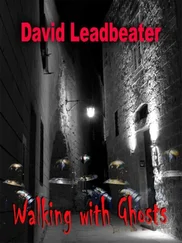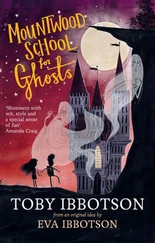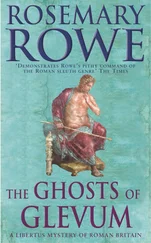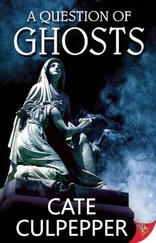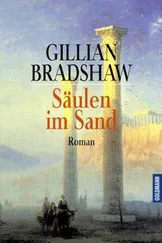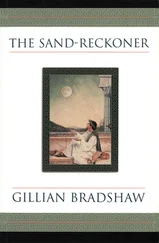Gillian Bradshaw - Island of Ghosts
Здесь есть возможность читать онлайн «Gillian Bradshaw - Island of Ghosts» весь текст электронной книги совершенно бесплатно (целиком полную версию без сокращений). В некоторых случаях можно слушать аудио, скачать через торрент в формате fb2 и присутствует краткое содержание. Жанр: Исторические приключения, на английском языке. Описание произведения, (предисловие) а так же отзывы посетителей доступны на портале библиотеки ЛибКат.
- Название:Island of Ghosts
- Автор:
- Жанр:
- Год:неизвестен
- ISBN:нет данных
- Рейтинг книги:3 / 5. Голосов: 1
-
Избранное:Добавить в избранное
- Отзывы:
-
Ваша оценка:
- 60
- 1
- 2
- 3
- 4
- 5
Island of Ghosts: краткое содержание, описание и аннотация
Предлагаем к чтению аннотацию, описание, краткое содержание или предисловие (зависит от того, что написал сам автор книги «Island of Ghosts»). Если вы не нашли необходимую информацию о книге — напишите в комментариях, мы постараемся отыскать её.
Island of Ghosts — читать онлайн бесплатно полную книгу (весь текст) целиком
Ниже представлен текст книги, разбитый по страницам. Система сохранения места последней прочитанной страницы, позволяет с удобством читать онлайн бесплатно книгу «Island of Ghosts», без необходимости каждый раз заново искать на чём Вы остановились. Поставьте закладку, и сможете в любой момент перейти на страницу, на которой закончили чтение.
Интервал:
Закладка:
I set my teeth and managed to sit up. “You can catch your own horse next time,” I said.
“It’s not my horse; it’s my commanding officer’s wife’s horse. If it had got hurt while I was in charge of it”-he whistled-“I might as well have resigned from the army at once. Priscus would never forgive me. By Maponus! Your leg’s bleeding.”
I looked: there was blood on my hands. The wound must have torn open. I let out my breath in a hiss.
The apple seller began to shout at the red-faced man in British. The red-faced man shouted back. I wanted to get away; I tried to climb to my feet, but when my weight came onto my injured leg, there was a spurt of such red-hot pain that I had to sit down again.
“Lie back, lie back,” said the young man, “Let me see your leg.. ” He began pulling the trouser leg up.
“No,” I said. “The horse caught an old wound. Leave it.”
He paid no attention whatsoever. “I know a bit of field surgery,” he told me. “My name’s Comittus, by the way, Lucius Javolenus Comittus, a tribune of the Sixth Legion… Hercules!” he’d shoved the trouser leg up above my knee, and seen the scars. There were three, one above the other, and since I’d only got them that summer, they were still red. To my relief, it was the top cut, the one just above my knee, that had broken open, and that only a little down half its length. The pain had been so hot I hadn’t been able to tell where it was. But the top cut had been the least serious of the three. It was the lowest slash that broke my shinbone.
“Lucius Javolenus?” came a woman’s voice. Comittus looked round quickly, and I looked too.
I guessed that this was his commanding officer’s wife, the owner of the horse. She was certainly a lady of some importance. Her fair hair was piled on her head in the kind of elaborate curls that require a trained slave to arrange them, and the cloak held modestly closed before her was of the most expensive kind, dyed a rich blue throughout, and bordered with patterned flowers. And despite the modesty, it was plain she was both young and beautiful. The rounded eyes were vividly, liquidly blue, an intensity of color I had never seen among the Romans before, though it’s not uncommon among my own people-Arshak’s eyes were much the same shade. The oddly familiar eyes stared into mine with impersonal curiosity. I did not look back at her gladly. Bad enough to look a fool; worse to look a fool in front of a beautiful woman.
“Aurelia Bodica,” cried Comittus, “this man caught your horse, but it kicked him on an old wound when he caught it. Do you think we could find Diophantes? I think he needs a doctor.”
The blue gaze sharpened. Aurelia Bodica ignored Comittus and stared at the scars. “It looks as though someone tried to chop off your leg with an axe,” she said, in a dispassionate, assessing voice.
“With a Dacian long sword,” I corrected her.
And suddenly the memory of it came over me with a terrible clarity: my horse falling in the mud, and the swordsman screaming and running at me as I rolled free, holding his sword two-handed above his head. His face was white, and there was a smear of blood down the side of it; his teeth as he screamed were like dogs’ teeth. I tried to scramble away, and the sword came down; I screamed, tried to roll over and get to my feet, and the sword came down; I rolled onto my back again, trying to get my own sword up, and the sword came down. Then somehow I managed to strike his sword with my own from a sitting position, and knocked it out of his hands. Then someone else hit me in the back, I was thrown forward onto my face, and the next thing I remember clearly is lying in the mud, soaked with blood, too cold for pain, and watching the moonlight silver the bronze eye-guard of the dead warhorse before me.
I pushed Comittus’ hands away from my leg. “I do not need a doctor,” I told him. “It is sore, but not serious.”
The apple seller plonked herself down and offered me a handkerchief of threadbare linen. “You can use this for a bandage, my lord, and I’ll get you a nice piece of raw beef to put on it. That’s the best thing for a bruise.”
“Thank you for the bandage,” I said, taking it and tying it around my leg, “I do not need the beef.” I pulled my trouser leg down and got my good leg under me, then rose cautiously to my feet. Everyone in the marketplace had crowded round to look at me. The white stallion had been tied to a post at one side. I felt an idiot.
“Do you want the fifteen denarii for catching the horse?” asked Comittus.
“I do not catch horses for money,” I said, straightening my coat and looking about for my hat.
“I didn’t think you did, somehow,” said Comittus cheerfully, “but I thought I’d offer. Can I buy you a drink, then? Would you care to come to dinner? You practically saved my life.”
I spotted my hat under the red-faced man’s foot, and limped painfully over. “My hat,” I told him, looking at it pointedly. He moved over at once, picked it up, and tried to dust it off. I took it from him and rubbed it clean on his cloak. He spluttered angrily, but couldn’t quite bring himself to protest: he knew he’d acted stupidly. Besides, I was a few inches taller than he and might have been dangerous. I pulled the hat onto my head.
“We’re staying at the naval base,” Comittus told me. “I escorted Aurelia Bodica to the temple of Minerva, just out of town, and we’d stopped for her to do some shopping when the horse got loose. I don’t have much space in my quarters at the base, but there’s a very good tavern just outside it…”
“I thank you, no,” I said. I turned to the apple seller. “Have the apples delivered to the naval base, to the house of Valerius Natalis. Say that Ariantes bought them, and they’re to be shipped to Bononia tomorrow.”
“You’re Sarmatian, aren’t you?” said Aurelia Bodica suddenly.
I turned back to her and met her eyes for a moment. “Yes,” I said. For a moment I was tempted to introduce myself-“Ariantes son of Arifarnes, scepter-holder and azatan of the Iazyges of the Sarmatians, prince-commander of the sixth dragon.” But what was the point? The titles would mean nothing to her, and I was not a scepter-holder or prince now: I was the commander of a troop of Roman auxiliary cavalry.
“Are you really?” exclaimed Comittus excitedly. “Then we’re comrades! We’ve come down from Eburacum to meet you!”
“What?” I demanded, staring at him.
“My commander, Julius Priscus, is legionary legate of the Sixth Victrix in Eburacum, and commander in chief of all the forces in the North. We were told to come down to Dubris to meet three troops of Sarmatian cavalry which were expected from Bononia. I’m going to be in command of one of them.”
“You?” I asked, in confused disbelief. “How, ‘in command’?”
“Well… as prefect of the ala, you know. The troops will have their own officers-I suppose you’re one of them-but I’ll be in charge, as they won’t… that is, I’d heard you wouldn’t be very used to Roman ways.”
I stared at him, appalled. My imagination suddenly shaped another picture of him, etched with a ferocity I hadn’t felt for months, and precise with details only too familiar: Comittus lying on the cobblestones with my spear in him, and my dagger’s edge running across his forehead, around the sides of his head, and lifting the curly brown scalp away from the reddened skull. How could any Roman, let alone this one, be in charge of my men-my dependants, my followers, my own people? And if the Romans expected to appoint some of their own people as prefects, what did they plan to do with Arshak, Gatalas, and myself? Second-in-command, joint command, what?
Even a joint command would end in disaster. Here I was, determined to safeguard my followers by keeping the peace with our Roman masters-and I ached to scalp the first Roman colleague I met. What would my officers do? Or my fellow commanders? I thought of Arshak and his coat of Roman scalps. This Comittus was as cheerful and bouncy as a puppy. Members of the equestrian order often begin their careers by serving as military tribunes on the staff of a legion. They don’t need any previous military experience, and I doubted Comittus had supplied any. He would manage Arshak about as well as the red-faced man had managed the white horse, and the result could easily be death and grief all round. Someone in Britain had miscalculated badly. Perhaps, like the procurator Valerius Natalis, they thought we were conquered barbarians.
Читать дальшеИнтервал:
Закладка:
Похожие книги на «Island of Ghosts»
Представляем Вашему вниманию похожие книги на «Island of Ghosts» списком для выбора. Мы отобрали схожую по названию и смыслу литературу в надежде предоставить читателям больше вариантов отыскать новые, интересные, ещё непрочитанные произведения.
Обсуждение, отзывы о книге «Island of Ghosts» и просто собственные мнения читателей. Оставьте ваши комментарии, напишите, что Вы думаете о произведении, его смысле или главных героях. Укажите что конкретно понравилось, а что нет, и почему Вы так считаете.

